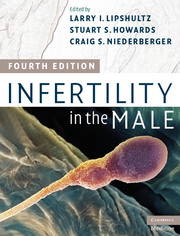Book contents
- Infertility in the Male
- Infertility in the Male
- Imprints
- Contents
- Contributors
- Forward
- Chapter 1 Anatomy and embryology of the male reproductive tract and gonadal development
- Chapter 2 Male hypothalamic–pituitary–gonadal axis
- Chapter 3 Leydig cell development and function
- Chapter 4 The Sertoli cell:
- Chapter 5 Spermatogenesis in the adult
- Chapter 6 The epididymis and accessory sex organs
- Chapter 7 An overview of the molecular mechanisms involved in human fertilization
- Chapter 8 New concepts in the genetics of male reproduction and infertility
- Chapter 9 Erection, emission, and ejaculation:
- Chapter 10 Office evaluation of the subfertile male
- Chapter 11 Evaluation of sperm function
- Chapter 12 Endocrine evaluation
- Chapter 13 Testicular biopsy in male infertility evaluation
- Chapter 14 Adverse effects of environmental chemicals and drugs on the male reproductive system
- Chapter 15 Genetic aspects of infertility
- Chapter 16 Immunologic infertility
- Chapter 17 The effect of genital tract infection and inflammation on male infertility
- Chapter 18 Varicocele
- Chapter 19 Evaluation of female infertility for the non-gynecologist
- Chapter 20 The use of ultrasound and radiologic imaging in the diagnosis of male infertility
- Chapter 21 Microsurgical treatment of male infertility
- Chapter 22 Techniques of sperm retrieval
- Chapter 23 Management of ejaculatory duct obstruction
- Chapter 24 Nonsurgical treatment of male infertility:
- Chapter 25 Nonsurgical treatment of male infertility:
- Chapter 26 Abnormalities of ejaculation
- Chapter 27 Male contraception and vasectomy
- Chapter 28 Intrauterine insemination from the urologist’s perspective
- Chapter 29 In-vitro fertilization and micromanipulation for male infertility
- Chapter 30 Psychological issues of infertility and assisted reproductive technology
- Chapter 31 Legal issues in fertility preservation
- Chapter 32 Analyzing male fertility data
- Chapter 33 Semen analysis
- Chapter 34 Strict criteria for sperm morphology
- Chapter 35 Sperm processing techniques
- Chapter 36 Sperm banking:
- Chapter 37 Tests for antisperm antibodies
- Chapter 38 Semen white blood cell assay
- Chapter 39 Determination of seminal oxidants (reactive oxygen species)
- Chapter 40 Measurement of DNA fragmentation in human spermatozoa
- Chapter 41 A look towards the future:
- Index
Chapter 30 - Psychological issues of infertility and assisted reproductive technology
Published online by Cambridge University Press: 19 May 2010
- Infertility in the Male
- Infertility in the Male
- Imprints
- Contents
- Contributors
- Forward
- Chapter 1 Anatomy and embryology of the male reproductive tract and gonadal development
- Chapter 2 Male hypothalamic–pituitary–gonadal axis
- Chapter 3 Leydig cell development and function
- Chapter 4 The Sertoli cell:
- Chapter 5 Spermatogenesis in the adult
- Chapter 6 The epididymis and accessory sex organs
- Chapter 7 An overview of the molecular mechanisms involved in human fertilization
- Chapter 8 New concepts in the genetics of male reproduction and infertility
- Chapter 9 Erection, emission, and ejaculation:
- Chapter 10 Office evaluation of the subfertile male
- Chapter 11 Evaluation of sperm function
- Chapter 12 Endocrine evaluation
- Chapter 13 Testicular biopsy in male infertility evaluation
- Chapter 14 Adverse effects of environmental chemicals and drugs on the male reproductive system
- Chapter 15 Genetic aspects of infertility
- Chapter 16 Immunologic infertility
- Chapter 17 The effect of genital tract infection and inflammation on male infertility
- Chapter 18 Varicocele
- Chapter 19 Evaluation of female infertility for the non-gynecologist
- Chapter 20 The use of ultrasound and radiologic imaging in the diagnosis of male infertility
- Chapter 21 Microsurgical treatment of male infertility
- Chapter 22 Techniques of sperm retrieval
- Chapter 23 Management of ejaculatory duct obstruction
- Chapter 24 Nonsurgical treatment of male infertility:
- Chapter 25 Nonsurgical treatment of male infertility:
- Chapter 26 Abnormalities of ejaculation
- Chapter 27 Male contraception and vasectomy
- Chapter 28 Intrauterine insemination from the urologist’s perspective
- Chapter 29 In-vitro fertilization and micromanipulation for male infertility
- Chapter 30 Psychological issues of infertility and assisted reproductive technology
- Chapter 31 Legal issues in fertility preservation
- Chapter 32 Analyzing male fertility data
- Chapter 33 Semen analysis
- Chapter 34 Strict criteria for sperm morphology
- Chapter 35 Sperm processing techniques
- Chapter 36 Sperm banking:
- Chapter 37 Tests for antisperm antibodies
- Chapter 38 Semen white blood cell assay
- Chapter 39 Determination of seminal oxidants (reactive oxygen species)
- Chapter 40 Measurement of DNA fragmentation in human spermatozoa
- Chapter 41 A look towards the future:
- Index
Summary
Keywords
- Type
- Chapter
- Information
- Infertility in the Male , pp. 516 - 527Publisher: Cambridge University PressPrint publication year: 2009
- 2
- Cited by

